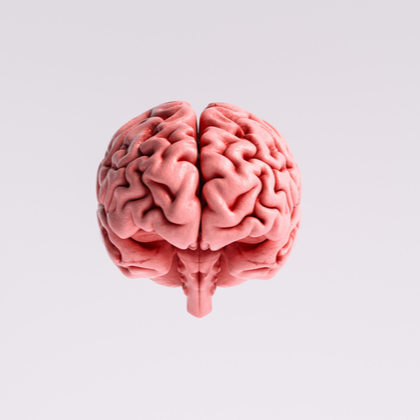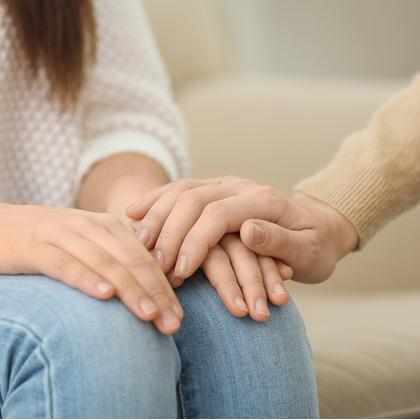
Though we may take them for granted sometimes, the relationships we have with other people are essential aspects of our lives. According to the Mental Health Foundation, relationships help us stay well, both physically and mentally. People who are more socially connected to friends, family or their community are happier, physically healthier and live longer, the charity says, with fewer mental health problems than those who aren’t so well connected (i).
If you’re happily married or in a stable relationship, the impact that has on your mental health is a positive one, with research suggesting you may experience lower levels of stress and less depression than someone who’s on their own (i).
Why is social support important for mental health?
The effects of close relationships on mental health may seem obvious, but what about other types of relationships?
The Mental Health Foundation says having good social ties within your community is important too, with people living in areas with higher levels of social togetherness having lower rates of mental health problems than those living in places with less social cohesion – irrespective of whether their neighbourhood is deprived or well-off. This may be particularly significant for older people, who may experience fewer symptoms of depression if they live in well-connected neighbourhoods (i).

Meanwhile if you’re living with mental ill health, having close ties with other people can be invaluable. During the Covid-19 lockdown, for instance, a survey by Rethink Mental Illness found 69 per cent of people with mental illnesses said their mental health was worse because they couldn’t see their family or friends (ii).
However, the quality of your relationships is really important too, as it’s thought that people who are single have better mental health outcomes than those who are unhappy in their relationships (i). In other words, it’s healthier to be alone than in a toxic or damaging relationship.
Indeed, experts say there’s evidence that negative relationships and social interactions – especially with those you’re closest to – may increase your risk of mental health problems such as depression and anxiety (iii).
How does mental health affect your relationships?
If things aren’t going well in a close relationship, there’s a good chance your mental wellbeing could be affected. But relationships can have an impact on your mental wellbeing in other ways too. For instance, if someone you’re close to has an existing issue with mental ill health, It can be very difficult to watch them struggle – and your own mental wellbeing could suffer as a result.
According to behavioural care service provider The Priory Group, there’s evidence that eight out of 10 people with mental ill health believe their condition has a detrimental effect on their family (iv). Some people with a family member who has a mental health condition may also develop mental health problems to such an extent that they too need help and support. That’s hardly surprising, since looking after a loved one with a mental illness is often very stressful.
There are three common mental wellbeing problems can affect you and the ones you love:
-
Relationships and stress
Anyone who has ever experienced it will know that stress can be damaging to relationships. It can make you feel low and you may want to spend more time than usual on your own, or it can make you argue with your partner often or lose your temper more frequently.
However, you react to being under too much pressure, it’s likely your relationships will feel the strain. If you start to withdraw from your partner, for instance, they may feel as if you’re pushing them away. Or if you’re more irritable than usual, your partner or other loved ones may start to become defensive and argumentative in response. -
Relationships and depression
While having strong, healthy relationships may help you cope if you feel low or depressed, being in a troubled relationship may have the opposite effect and trigger depression symptoms. Experts from relationship counselling charity Relate suggest those who aren’t happy in their relationship are three times more likely to experience depression than those who are. The charity adds some studies have found more than 60 per cent of people with depression say relationships problems are the main cause of their condition (v).
Depression can make it difficult for you to communicate effectively, which can be upsetting for your loved ones. You may also start to feel guilty that you’re making life difficult for those around you, which can drain your self-esteem.
If, on the other hand, your loved one is depressed you may feel extra pressure to make sure life runs as smoothly as possible by taking on more responsibility than you’re used to, while at the same giving them the support they need. Doing too much, however, can make you feel exhausted and burned out, and you may sooner or later start to lose patience with them. -
Relationships and anxiety
If you’re anxious all or most of the time, it too can take its toll on your relationships. Anxiety can make you feel tense, which may make it hard for you to relax when you’re with your partner, friends or family. And if you feel any less than 100 per cent secure in your relationship with your other half, you may worry constantly that the relationship will end or you may need endless reassurance that they’re not going to break up with you – neither of which is a recipe for a successful partnership.
Meanwhile if someone you love is living with anxiety it can be difficult to watch them battle with their issues. Some people may even start to worry that they’re the cause of anxiety in their partner or loved one, putting even more pressure on the relationship.
How to help someone with mental health
If someone you’re in a close relationship with has a problem with their mental wellbeing, it can be hard to know what you should do and how you could help them. Talking about what’s troubling them is arguably the first and even possibly the most important way to give them support. But mental health isn’t something that’s easy to talk about.
One way to broach the subject would be to talk about people in the public eye who have had mental health issues. For instance, try mentioning a celebrity who has talked about their mental health – but do so casually, while having a meal or doing the shopping rather than trying to start a conversation in a more formal way. Try not to make them talk about themselves if they don’t want to, instead keep the conversation relaxed and resist the temptation to ask them too many questions.
If they do want to talk, give them plenty of time to speak and try to listen carefully without any interruptions. Try repeating what they’ve said back to them as this shows them that you’ve understood what they’ve said. Even if you don’t agree with what they’re saying try to show that you understand and respect their feelings.
Meanwhile, try not to let all your conversations revolve around how they’re feeling. Talk about everyday things too, as it may be important for them to know that life is still normal, even if they feel it isn’t.
Then when you feel the time is right, help them to find reliable information about their mental health problem. Reliable mental health services include NHS UK, the Mental Health Foundation, Time To Change, Rethink Mental Illness, and Mind, or take a look at Mind’s useful contacts page.
You could also encourage them to use one of the online forums set up for people with mental health issues, where they can chat with others who know what they’re going through. These include Side by Side, Health Talk and the Mental Health Forum. The Mental Health Foundation also offers podcasts and videos
Meanwhile don’t forget to look after yourself if you’re supporting someone with mental wellbeing difficulties. It can be very stressful to live with someone with a mental health problem, so try to make sure you look after your own wellbeing too or you may find your own health starts to suffer. Try and stay active and eat as healthily as possible and make time for activities you enjoy or find relaxing.
How to nurture your relationships
Whether you have problems with mental ill health or not, it’s important to value and nurture your relationships, both the old ones and the new. Here are a few tips to help give your relationships a boost:
-
Try to find more time to be with friends, family and others you care about. Show or tell them how much you appreciate them regularly.
-
When you’re with someone, give them your full attention. Try to resist the temptation to check the notifications on your phone – in fact, if you can, switch off from all distractions and try to really be present in the moment
-
Get into the habit of asking your loved ones and those around you how they are. When they speak, listen to them carefully and try not to interrupt or change the subject. Really try to understand their perspective. Focus on what their needs may be at that point and try not to be judgmental or critical.
-
Don’t just ask others how they are, share how you’re feeling too. Be truthful and let them support you if they want to. Be open to feedback.
-
Whenever possible try to be a good neighbour and active in your community. Look out for people living close by who may be isolated or need help
-
Learn to recognise when a relationship may be doing you harm. If someone makes you unhappy, afraid or experience other negative emotions, it can damage your wellbeing. If you can admit this is happening it can help you to move forward and find a solution.
How to improve mental health naturally
If you or someone close to you has a mental wellbeing problem it’s important that you or they get professional medical advice. But as well as seeing a health professional there are some things you can do to help yourself, including:
-
Eating a healthy, nutritious diet
-
Being physically active
-
Drinking alcohol in moderation (14 units or less each week)
-
Cutting down on/giving up other stimulants such as caffeine and nicotine
-
Getting plenty of rest/sleep
-
Making time for relaxation and destressing
Besides having a lifestyle that’s as healthy as possible, there are also some nutritional supplements you may like to try if you’re experiencing issues with your mental wellbeing. Eating healthily is of course important, since it helps to make sure your body is getting all the nutrients it needs. However if you’re not eating as healthily as you should for any reason, taking a good-quality multivitamin and mineral supplement may be a good idea, especially since there’s some evidence to suggest a multivitamin may help you cope with stressful situations (vi).
How to improve mental health naturally
Other nutritional supplements that may be useful if you’re experiencing symptoms of problems such as anxiety, stress and low mood include the following:
5-HTP
The amino acid 5-HTP – or 5-Hydroxytryptophan – is often used as a remedy for depression and low mood as it’s a natural compound that’s converted in the brain to serotonin. Indeed, some studies suggest it may be as effective as conventional antidepressants (vii). There’s also some evidence that 5-HTP may help with anxiety disorders (viii).
St John’s wort
St John’s wort is a popular herbal remedy used for the relief of slightly low mood and mild anxiety, based on traditional use only. There’s evidence it may be more effective than a placebo at treating mild to moderate depression (ix). Studies also suggest it may be as effective as some popular prescription antidepressants (x).
Always speak to your GP or pharmacist if you’re taking any other medicines before trying St John’s wort, as it may interact with certain medicines including the contraceptive pill.
Fish oils
The omega-3 fatty acids EPA and DHA, which are found in oily fish, have been studied extensively in relation to a range of health problems, including depression.
One study involving older women suffering from depression showed that, after taking high doses of EPA and DHA for eight weeks, their symptoms had improved significantly compared to other women who received a placebo (xi). Other studies have investigated the benefits of EPA in treating depression, with some suggesting it may be helpful (xii).
You can get omega-3 fatty acids by eating more oily fish such as salmon, trout, herring, mackerel, pilchards and sardines, or by taking fish oil supplements. Vegetarian and vegan omega-3 supplements are also more widely available these days. These supplements source their active ingredients from plant organisms called microalgae rather than fish.
Ashwagandha
This traditional Ayurvedic herb is often used to help with tiredness, fatigue and stress. One small-scale study suggests ashwagandha may reduce levels of the stress hormone cortisol (xiii), while another found 88 per cent of trial participants felt less anxious after taking it (xiv).
Researchers believe ashwagandha may help relieve stress because of the way it moderates interaction between the hypothalamus – a small region in the brain – and the pituitary and adrenal glands (the hypothalamus-pituitary-adrenal axis) (xv). The HPA axis is thought to play a key role in the body’s response to stress.
Rhodiola Rosea
Rhodiola is a herb used traditionally throughout Europe for stress relief. Its roots contain many active ingredients, including rosavin and salidroside. There is some evidence it may help reduce anxiety and stress more effectively than a placebo (xvi), with one study finding it effective in people with burnout symptoms (xvii). Another study concludes that rhodiola may treat stress symptoms comprehensively as well as prevent chronic stress and stress-related complications (xviii).
If you want to try rhodiola, look for a supplement that guarantees a potent 3% level of rosavins.
Theanine
Found almost exclusively in green, black, oolong and pekoe tea, theanine is a non-protein amino acid that’s thought to help your brain produce calming alpha waves. Studies suggest taking a theanine supplement may help you feel more relaxed without making you drowsy (xix), and that it may make you feel calmer by reducing your heart rate when you’re faced with something that stresses you out (xx).
Strong, healthy relationships are important for our mental health – but mental health issues can make our relationships difficult too. However, it’s encouraging to know there are things you can do to make your relationships – and mental wellbeing – better. To find out more about supporting your mental wellbeing, take a look at the mental health section of our health library.
References:
-
Available online: https://www.mentalhealth.org.uk/publications/relationships-21st-century-forgotten-foundation-mental-health-and-wellbeing
-
Available online: https://www.rethink.org/news-and-stories/news/2020/04/80-of-people-living-with-mental-illness-say-current-crisis-has-made-their-mental-health-worse/
-
Available online: https://www.mentalhealth.org.uk/sites/default/files/Relationships-in-21st-century-forgotten-foundation-mental-health-wellbeing-full-may-2016.pdf
-
Available online: https://www.priorygroup.com/blog/does-mental-health-affect-and-impinge-on-family-relationships
-
Available online: https://www.relate.org.uk/sites/default/files/publications/uploads/relationships-and-mental-health-briefing-may-2016.pdf
-
Schlebusch L. et al., A double-blind, placebo-controlled, double-centre study of the effects of an oral multivitamin-mineral combination on stress. S Afr Med J. 2000;90:1216-1223.
-
Byerley WF. et al., 5-hydroxytryptophan: a review of its antidepressant efficacy and adverse effects. J Clin Psychopharmacol. 1987;7(4):127-37. Available online: https://pubmed.ncbi.nlm.nih.gov/3298325-5-hydroxytryptophan-a-review-of-its-antidepressant-efficacy-and-adverse-effects/
Poldinger . W, Calanchini. B, Schwarz. W. A functional-dimensional approach to depression: Serotonin deficiency as a target syndrome in a comparison of 5-hydroxytryptophan and fluvoxamine. Psychopathology. 1991;24:53-81.Available online: https://pubmed.ncbi.nlm.nih.gov/1909444-a-functional-dimensional-approach-to-depression-serotonin-deficiency-as-a-target-syndrome-in-a-comparison-of-5-hydroxytryptophan-and-fluvoxamine/ -
Kahn RS. et al., Effect of a serotonin precursor and uptake inhibitor in anxiety disorders; a double-blind comparison of 5-hydroxytryptophan, clomipramine and placebo. Int Clin Psychopharmacol. 1987;2:33-45. Available online: https://pubmed.ncbi.nlm.nih.gov/3312397-effect-of-a-serotonin-precursor-and-uptake-inhibitor-in-anxiety-disorders-a-double-blind-comparison-of-5-hydroxytryptophan-clomipramine-and-placebo/
-
Kasper S. et al., Superior efficacy of St Johns wort extract WS® 5570 compared to placebo in patients with major depression: a randomized, double-blind, placebo-controlled, multi-center trial. BMC Med. 2006 Jun 23
Uebelhack R. et al., Efficacy and tolerability of Hypericum extract STW 3-VI in patients with moderate depression: a double-blind, randomized, placebo-controlled clinical trial. Adv Ther. 2004;21:265-75. -
Singer A. et al., Duration of response after treatment of mild to moderate depression with Hypericum extract STW 3-VI, citalopram and placebo: a reanalysis of data from a controlled clinical trial. Phytomedicine. 2011;18(8-9):739-742. Available online: https://www.ncbi.nlm.nih.gov/pubmed/18441173
Bjerkenstedt L. et al., Hypericum extract LI 160 and fluoxetine in mild to moderate depression, A randomized, placebo-controlled multi-center study in outpatients. Eur Arch Psychiatry Clin Neurosci. 2004 Nov 12 -
Rondanelli M. et al., Effect of omega-3 fatty acids supplementation on depressive symptoms and on health-related quality of life in the treatment of elderly women with depression: a double-blind, placebo-controlled, randomized clinical trial. J Am Coll Nutr. 2010 Feb;29(1):55-64. Available online: https://www.tandfonline.com/doi/abs/10.1080/07315724.2010.10719817
-
Jazayeri S. et al., Comparison of therapeutic effects of omega-3 fatty acid eicosapentaenoic acid and fluoxetine, separately and in combination, in major depressive disorder. Aust N Z J Psychiatry. 2008;42:192-198. Available online: https://journals.sagepub.com/doi/10.1080/00048670701827275
-
Chandrasekhar. K, Kapoor. J, Anishetty. S. A prospective, randomized double-blind, placebo-controlled study of safety and efficacy of a high-concentration full-spectrum extract of ashwagandha root in reducing stress and anxiety in adults. Indian J Psychol Med. 2012 Jul;34(3):255-62.Available online: https://www.ncbi.nlm.nih.gov/pmc/articles/PMC3573577/
-
Anrade C. et al., A double-blind, placebo-controlled evaluation of the anxiolytic efficacy ff an ethanolic extract of withania somnifera. Indian J Psychiatry. 2000 Jul;42(3):295-301. Available online: https://www.ncbi.nlm.nih.gov/pubmed/21407960
-
Lopresti A. et al., An Investigation Into the Stress-Relieving and Pharmacological Actions of an Ashwagandha (Withania Somnifera) Extract: A Randomized, Double-Blind, Placebo-Controlled Study. Medicine (Baltimore). 2019 Sep;98(37). Available online: https://pubmed.ncbi.nlm.nih.gov/31517876/
-
Cropley M. et al., The Effects of Rhodiola rosea L.Extract on Anxiety, Stress, Cognition and Other Mood Symptoms. Phytother Res. 2015 Dec;29(12).1934-9 Available online: https://www.ncbi.nlm.nih.gov/pubmed/26502953
-
Kasper. S., Dienel A., Multicenter, open-label, exploratory clinical trial with Rhodiola rosea extract in patients suffering from burnout symptoms. Neuropsychiatr Dis Treat. 2017;13:889-898. Available online: https://www.ncbi.nlm.nih.gov/pmc/articles/PMC5370380/
-
Anghelescu IG. et al., Stress Management and the Role of Rhodiola rosea: A Review. Int J Psychiatry Clin Pract. 2018 Nov;22(4):242-252. Available online: https://pubmed.ncbi.nlm.nih.gov/29325481/?from_term=rhodiola+stress&from_pos=1
-
Turkozu. D., Sanlier N., L-theanine, unique amino acid of tea, and its metabolism, health effects, and safety. Crit Rev Food Sci Nutr. 2017 May 24;57(8):1681-1687. Available online: https://www.ncbi.nlm.nih.gov/pubmed/26192072
-
Kimura K. et al., L-Theanine Reduces Psychological and Physiological Stress Responses. Biol Psychol. 2007 Jan;74(1):39-45. Available online: https://pubmed.ncbi.nlm.nih.gov/16930802/?from_term=theanine+stress&from_pos=2
Related Posts
Disclaimer: The information presented by Nature's Best is for informational purposes only. It is based on scientific studies (human, animal, or in vitro), clinical experience, or traditional usage as cited in each article. The results reported may not necessarily occur in all individuals. Self-treatment is not recommended for life-threatening conditions that require medical treatment under a doctor's care. For many of the conditions discussed, treatment with prescription or over the counter medication is also available. Consult your doctor, practitioner, and/or pharmacist for any health problem and before using any supplements or before making any changes in prescribed medications.

Keri
Keri Filtness has worked in the Nutrition Industry for 19 years. She is regularly called upon for her professional comments on health and nutrition related news. Her opinions have been featured by BBC3, Prima, Vitality, The Mirror, Woman’s Own and Cycling Weekly, amongst others. She has also worked one to one with journalists, analysing their diets and health concerns and recommending changes and additions, where appropriate.
View More



